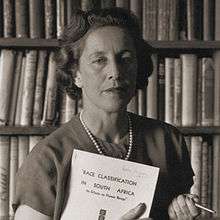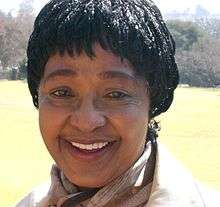United Nations Prize in the Field of Human Rights
The United Nations Prizes in the Field of Human Rights were instituted by United Nations General Assembly resolution 2217 in 1966. They are intended to "honour and commend people and organizations which have made an outstanding contribution to the promotion and protection of the human rights embodied in the Universal Declaration of Human Rights and in other United Nations human rights instruments".
They were first awarded in 1968, and they have been given out at five-year intervals since then. The award ceremony traditionally takes place on 10 December, which the UN has designated Human Rights Day. The recipients are selected by a special committee comprising the presidents of the General Assembly and the Economic and Social Council and the chairs of the Commission on Human Rights, the Commission on the Status of Women, and the Sub-Commission on the Promotion and Protection of Human Rights.
The physical token of the award is a metal plaque bearing the UN seal and an artistic design, and engraved with an appropriate citation. In contrast to the Nobel prizes – and the list of prizewinners shares much common ground with the Nobel Peace Prize in particular – the UN's awards are non-monetary in nature.
1968 Prizewinners

- Manuel Bianchi, chairman of the Inter-American Commission on Human Rights (Chile)
- René Cassin, member of the UN Commission on Human Rights (France)
- Albert Luthuli, president of the African National Congress (posthumous award) (South Africa)
- Mehranguiz Manoutchehrian, attorney and senator (Iran)
- Petr Emelyanovich Nedbailo, member of the UN Commission on Human Rights (Ukraine)
- Eleanor Roosevelt, president of the UN Commission on Human Rights (posthumous award) (United States)
1973 Prizewinners
- Taha Hussein, professor of literature (Egypt)
- C. Wilfred Jenks, director-general of the International Labour Office (posthumous award) (United Kingdom)
- María Lavalle Urbina, lawyer and lecturer (Mexico)
- Abel Muzorewa, president of the United African National Council (Rhodesia)
- Seewoosagur Ramgoolam, prime minister (Mauritius)
- U Thant, UN secretary-general (Burma)
1978 Prizewinners

- Begum Ra'Ana Liaquat Ali Khan (Pakistan)
- Prince Sadruddin Aga Khan (Iran)
- Martin Luther King (posthumous award) (United States)
- Helen Suzman (South Africa)
- International Committee of the Red Cross
- Amnesty International
- Vicaría de la Solidaridad (Chile)
- Union nationale des femmes de Tunisie (Tunisia)
1988 Prizewinners

- Baba Amte, human rights lawyer (India)
- John Peters Humphrey, director of the United Nations Division of Human Rights (Canada)
- Adam Lopatka, president of the Supreme Court (Poland)
- Leonidas Proaño, Roman Catholic bishop (Ecuador)
- Nelson Mandela, lawyer and statesman (South Africa)
- Winnie Mandela, medical social worker (South Africa)
1993 Prizewinners
- Hassib Ben Ammar, president of the Tunisian Human Rights League and of Arab Organization for Human Rights (Tunisia)
- Erica-Irene Daes, chair of the UN's Working Group on Indigenous Populations (Greece)
- James P. Grant, executive director of UNICEF (United States)
- International Commission of Jurists (based in Geneva)
- Medical personnel of the Central Hospital of Sarajevo
- Sonia Picado Sotela, vice-president of the Inter-American Court of Human Rights (Costa Rica)
- Ganesh Man Singh, supreme leader of Nepal (Nepali: सर्वमान्य नेता)[1] and commander of 1990 Democracy Movement [2] (Nepal)
- Sudanese Women's Union (Sudan)
- Julio Tumiri Javier, founder of the Permanent Assembly for Human Rights (Bolivia)
1998 Prizewinners

- Sunila Abeysekera, executive director of INFORM (Sri Lanka)
- Angelina Acheng Atyam, founder of Concerned Parents Association (Uganda)
- Jimmy Carter, statesman and former president (United States)
- José Gregori, secretary of state for human rights (Brazil)
- Anna Sabatova, founder of Charter 77 (Czech Republic)
- All human rights defenders, "thousands of courageous individuals worldwide"
2003 Prizewinners
- Enriqueta Estela Barnes de Carlotto, president of the Grandmothers of the Plaza de Mayo (Argentina)
- Mano River Women's Peace Network (Sierra Leone, Liberia, and Guinea)
- Family Protection Project Management Team (Jordan)
- Deng Pufang, chairman of the China Disabled Persons' Federation (People's Republic of China)
- Shulamith Koenig, executive director of the People's Movement for Human Rights Education (United States)
- Sérgio Vieira de Mello, UN Special Representative murdered in Iraq (posthumous award) (Brazil)
2008 Prizewinners

- Louise Arbour, former UN High Commissioner for Human Rights (Canada)
- Benazir Bhutto, assassinated former prime minister and leader of the opposition (posthumous award) (Pakistan)
- Ramsey Clark, former Attorney General (United States)
- Dr. Carolyn Gomes of Jamaicans for Justice
- Dr. Denis Mukwege, co-founder of the General Referral Hospital of Panzi (Democratic Republic of the Congo)
- Sr. Dorothy Stang, murdered Roman Catholic nun (posthumous award) (Brazil)
- Human Rights Watch
2013 Prizewinners[3]
- Biram Dah Abeid, son of a freed slave who works to eradicate slavery (Mauritania)
- Hiljmnijeta Apuk, a campaigner for the rights of people of short stature (Kosovo)
- Liisa Kauppinen, President Emeritus of the World Federation of the Deaf (Finland)
- Khadija Ryadi, former President of the Morocco Association for Human Rights (Morocco)
- Supreme Court of Justice (Mexico)
- Malala Yousafzai, schoolgirl shot by the Taliban for attending school (Pakistan)
References
- ↑ इतिहास पुरुषहरुका दृष्टिमा गणेशमान सिंह, Page 131, (Diamond Sumsher Rana), Publisher:Ganesh Man Singh Foundation
- ↑ Letter to "Mission Pemanente, Du Royamu Du Nepal, Aupres de l'office des Nations Unies, Geneve" by Nepalese Ambassador, Jayaraj Acharya, nominating Ganesh Man Singh for Human Right Award, Page 63, श्रद्धांजली
- ↑ https://www.un.org/apps/news/story.asp?NewsID=46668&Cr=human+rights&Cr1#.UqD7FMRDsQN